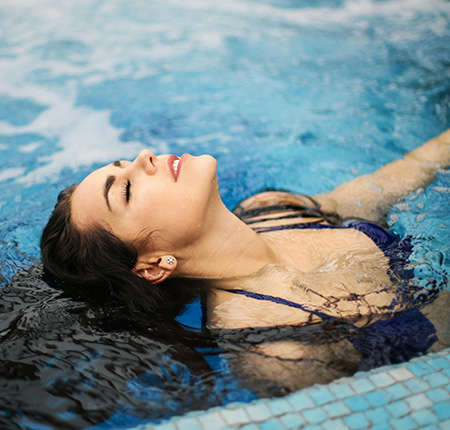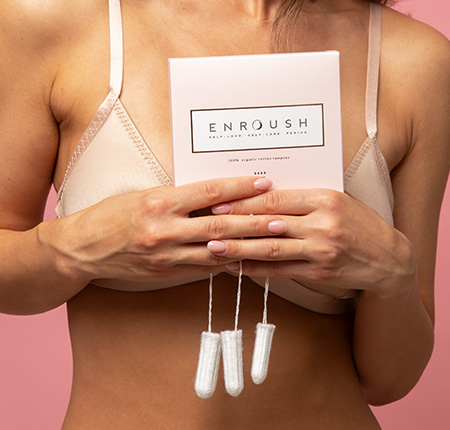
What do you think, are you ready to talk about menstruation again? You know, that time of the month that's so controversial when you're told you're not allowed to do anything? When you're told you're better off avoiding wearing white jeans, exercising, having sex... and when swimming is just another prohibition added to the list. But what if we told you that all of these are myths? That in fact, even when you're on your period, you can do almost everything you do on any other day?
Not only is swimming during your period safe and hygienic, it can actually be beneficial. So no, you don't have to cancel your beach or pool plans just because you're on your period. You just need some information and the right products to continue doing everything you love, unhindered. Let's tell you what they are!
Is it recommended to swim during menstruation?
Yes, you can safely swim during your period. You can go to the beach, you can sit by the pool, you can even win a swimming competition! Did you know that at the 2016 Rio Olympics, Fu Yuanhui was on her period when she broke her personal and national record and won the bronze medal in the 100m backstroke semi-final?
Menstruation is not there to hinder you, ruin your plans, and stop you from doing what you love. It's just your body's way of telling you, month after month, that everything is okay with your reproductive system and hormonal balance. And swimming, like any other light or moderate form of exercise, is recommended during this period because it can have important benefits for your health and mood.
Myths about swimming during menstruation
If swimming is really recommended and has so many benefits, then why were you told to avoid going to the pool? Why did you grow up with the idea that you can't swim during your period?
Most likely, for the same reason why thousands of women still think it's normal to cancel their plans or face unbearable cramps during their period: lack of information.
In the absence of accurate information, all kinds of myths circulate that have no scientific basis, but which nevertheless cause us to put our lives on hold, continuing to perpetuate the shame and revulsion towards menstruation. Some of these myths concern swimming during delicate days, so let's talk about them and establish once and for all how much is truth and how much is misinformation.
It is not safe.
Mostly false. In general, swimming during menstruation does not pose any increased risk of infection, for you or others. On the contrary, for a healthy person, swimming is a safe form of exercise and there is no reason not to do it during menstruation.
There is a grain of truth to this, but we are talking about exceptions here. In certain situations, your doctor may recommend that you temporarily avoid swimming (for example, when you have a vaginal infection and the treated water in the pool could promote inflammation). But keep in mind that these recommendations are specific, in exceptional situations, and not generalities.

It is not hygienic.
The fact that swimming during menstruation, or even menstrual blood itself, is unhygienic is one of the most commonly heard myths. But it's false.
First of all, because the chance of menstrual blood getting into the water is very small. Due to the pressure of the water which can temporarily slow down your menstrual flow, and due to the tampon, the blood will most likely stay in the vagina and not get into the water.
But even in the unlikely event that you don't secure your tampon properly and have a slight leak, you don't have to worry about hygiene. The pool water is treated with various chemicals precisely to keep the water clean and prevent the transmission of infections or blood-borne diseases.
Menstrual cramps will get worse
Have you also been told that your cramps will get worse and you will bleed if you stand in water or swim? That's just another myth, and the truth is just the opposite.
In fact, swimming can even help reduce cramps and improve symptoms of premenstrual syndrome. By promoting muscle relaxation and blood circulation, it can be a perfect physical activity to de-stress and reduce menstrual pain.
Swimming during menstruation - Benefits
Instead of paying attention to all the unfounded rumors that tell you that you shouldn't swim during your period, discover what science supports and what are the benefits you can enjoy from swimming during your period:
- May help relieve menstrual cramps
- May reduce bloating and water retention
- It can help you relax and reduce stress levels.
Products to use when swimming during menstruation
While there are a lot of myths out there, some of the things people say about swimming on your period are true. One of them is that pads are not effective in water.
Instead, there are other effective underwater menstrual products that you can use when swimming during your period without worrying about leaks and stains:
Internal buffers
Internal tampons are the most practical and safest solution, because they are invisible under your swimsuit and absorb menstrual blood immediately, directly at the vagina. Choose 100% organic, hypoallergenic tampons , without perfume or other chemicals, for safe and delicate protection. No one but you will know that you are on your period.
However, here are a few things to keep in mind before swimming with a tampon. These are not necessarily disadvantages, but rather some important details for your comfort and safety:
- Choose a mini tampon for light flow days. The absorbency should be high enough to protect you from leaks, but not so high that it makes it difficult to remove the tampon.
Make sure to change your tampon at least every 4-6 hours, and as soon as you get out of the water, to prevent bacteria from building up and creating a favorable environment for infections.

Menstrual briefs/swimsuits
If, for various reasons, you cannot or do not want to use internal tampons, you can enter the water wearing a menstrual swimsuit. Wearing a swimsuit may be more comfortable for some people than inserting a tampon into the vagina, and can be a suitable solution for days with a light flow.
However, menstrual swimsuits can have several disadvantages compared to internal tampons. On days with heavy flow, their absorbency may not be high enough and may allow leakage. Also, some models may not absorb menstrual blood effectively under water pressure. The higher cost and longer drying time than regular swimsuits are two other disadvantages that you should take into account.
Swimming during menstruation - Why are sanitary pads not recommended?
Panty liners can be a comfortable solution when you're walking, exercising, or sleeping. But it's true that they're not recommended when swimming. Not because they're harmful, but because they become useless the moment you get in the water.
Because they are super absorbent, they will fill up immediately when you get in the water, trying to absorb it. This means they won't be able to effectively absorb menstrual blood later on.
Plus, unlike internal pads, pads aren't invisible. Unless you're wearing shorts or covering up, the fins will be visible on the outside of your panties, so they might not be the best solution for a day at the beach.
When should you avoid swimming during menstruation?
For healthy people, swimming during menstruation is not a problem. On the contrary, it can come with a lot of benefits.
But there are certain situations when it is recommended to avoid swimming during menstruation and to go to the doctor as soon as possible for a specialist consultation:
- When you have a very heavy menstrual flow and don't feel comfortable swimming.
- If you have severe pain or very strong cramps that prevent you from enjoying swimming.
When you are dealing with a vaginal infection or a urinary tract infection .

Frequently asked questions about swimming during menstruation
Do you still have questions that were not answered in our article? You might find them below! Because we want you to be properly informed and to get rid of the fear of going to the beach or on vacation just because you are on your period, in this section we have answered the most frequently asked questions about swimming during menstruation.
Can you have watery discharge during menstruation?
Yes, it's possible for menstrual blood to leak into the water, especially if you're not wearing the right size tampon or other effective menstrual product. But keep in mind that water pressure can temporarily slow your menstrual flow while swimming, so the likelihood of leakage is reduced.
However, as soon as you get out of the water or start doing intense movements, the pressure effect may disappear and leakage may occur. There is nothing shameful or tragic about it, but you will definitely feel more comfortable and protected wearing a tampon.
Does swimming temporarily stop menstruation?
No, your period doesn't stop just because you get in the water and swim. What actually happens is that the water pressure can significantly reduce your menstrual flow while you're underwater, but it doesn't stop it completely. Your period continues inside your body, and your flow returns to normal once you get out of the water.
Is it hygienic to go into the water during menstruation?
Yes, you can safely enter the water even during your period because it is safe for both you and others. Even in the unlikely event that you have a leak in addition to your menstrual products, that is exactly the purpose of the chemicals used in swimming pools: to help maintain the hygiene of the water, thus preventing the transmission of infections.
Does swimming reduce menstrual pain?
Numerous studies have shown that light physical activities, such as swimming, can help reduce menstrual pain. These forms of exercise stimulate blood circulation and the release of endorphins, helping to reduce cramps and menstrual discomfort.
When should you change your tampon after swimming?
It is recommended to change your tampon as soon as you get out of the pool. It can also absorb some of the water while swimming, which makes it less effective against leaks and can increase the risk of irritation. Also, if you are planning a full day at the pool, make sure to change your tampon at least every 4-6 hours to prevent irritation and infection.
How long can you stay in water when you're on your period?
You can stay in the water for as long as you feel comfortable. Just make sure to change your tampon as soon as you get out of the pool, at least every 4-6 hours, so that it effectively protects you against leaks and infections.
Photo source: Pexels.com






















